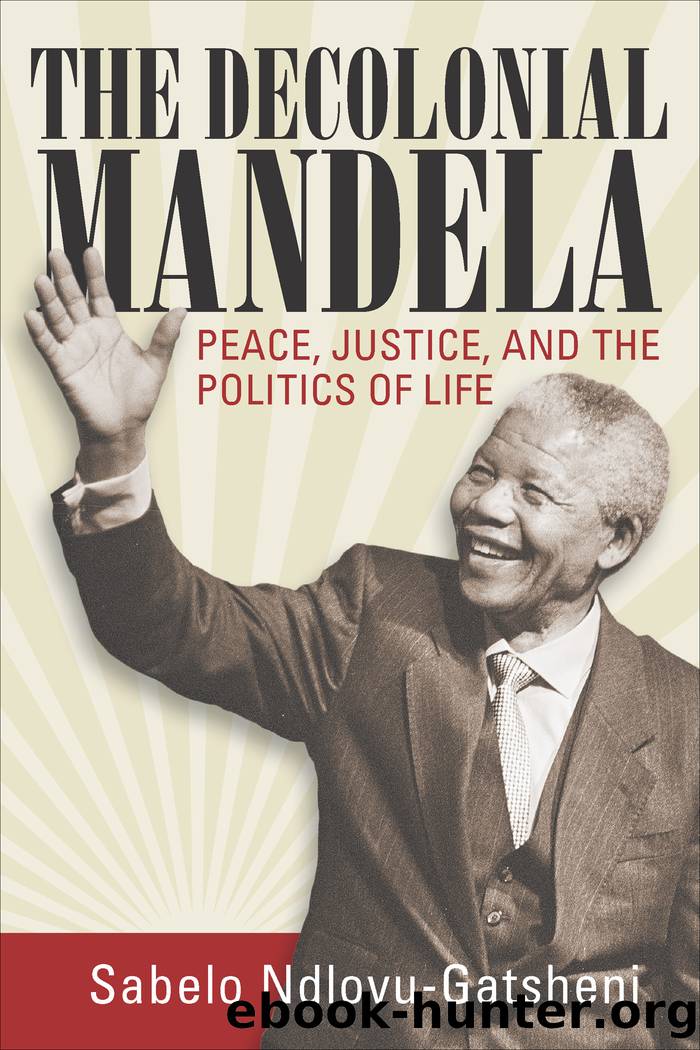The Decolonial Mandela: Peace, Justice and the Politics of Life by Sabelo J. Ndlovu-Gatsheni

Author:Sabelo J. Ndlovu-Gatsheni [Ndlovu-Gatsheni, Sabelo J.]
Language: eng
Format: epub
Tags: South, Africa, Republic of South Africa, Political Science, History, Colonialism & Post-Colonialism, Human Rights
ISBN: 9781785331190
Google: d5AgCgAAQBAJ
Goodreads: 28481155
Publisher: Berghahn Books
Published: 2016-03-01T00:00:00+00:00
Antinomies in Mandelaâs Life
The best way to do justice to the analysis of Mandelaâs complex life struggle is to see it as constituted by a plurality of antinomies, ambiguities and contradictions, just like that of other freedom fighters. For active political humanists like Mandela, the personal became political too. The celebrated South African historian Philip Bonner (2014: 29â30) identified five antinomies of Mandela. The first was between his early socialization informed by his rural upbringing and the urban and modern life he lived in Johannesburg. How did Mandela reconcile these two influences? It seems he used both influences selectively and strategically as per the situation in the course of his life of struggle. This point is well captured by Zolani Ngwane when he argued: â[t]he winning secret in this masculinist discourse is that the subject is able to negotiate himself out of tradition without making the politically and culturally unpopular choice of âmodernityâ, but by embedding tradition (or rather, certain modalities of tradition) in the very expression of African nationalism itselfâ (Ngwane 2014: 116). Mandela like other African nationalists engaged in the creative activity of translating traditional influences and local symbols into usable tools of the nationalist struggle through the deployment of nationalist metaphors pregnant with liberatory messages. Tradition and culture became weapons of the nationalist, decolonial and liberatory struggle. For example, his appearance at the Rivonia Trials donning the traditional Xhosa kaross had a meaning in the context of a people resisting colonial apartheid that pretended to be founded on European modernity. As he put it: âI had chosen traditional dress to emphasize the symbolism that I was a black African walking into a white manâs courtâ (Mandela 1994: 168).
But Ngwane (2014: 115) highlighted a serious tension if not contradiction in Mandelaâs relation to tradition and modernity. In the first place, in the early pages of his autobiography Mandela emphasized how he was a child of tradition and custom where â[t]his was the alpha and omega of our existence and went unquestionedâ (Mandela 1994: 11). But in 1996 when Winnie Mandela tried to use Xhosa tradition to oppose divorce, arguing that Mandela should have used traditional elders to mediate their disputes, Mandela declared in court that âI respect custom but I am not a tribalist. I fought as an African nationalist and I have no commitment to the custom of any particular tribeâ (quoted in Meredith 1997: 541).
The second antinomy was between family life and political life. Colonialism, particularly its initiation of migrant labour, directly threatened African family life. In South Africa the urban areas were for whites. Male labourers were allowed as per the needs of colonial capitalism. A combination of modern colonial patriarchal ideas and precolonial traditional patriarchy produced and consolidated female domesticity. Africans like Mandela who became active in African nationalist politics became even more prone to sacrifice family for the wider nationalist liberation struggle. Harassment, imprisonment and detention became their political identity. This is why Brenna Munro wrote: âThe unfolding public saga of Nelson Mandelaâs
Download
This site does not store any files on its server. We only index and link to content provided by other sites. Please contact the content providers to delete copyright contents if any and email us, we'll remove relevant links or contents immediately.
| Central Africa | East Africa |
| North Africa | Southern Africa |
| West Africa | Algeria |
| Egypt | Ethiopia |
| Kenya | Nigeria |
| South Africa | Sudan |
| Zimbabwe |
Goodbye Paradise(3802)
Men at Arms by Terry Pratchett(2832)
Tobruk by Peter Fitzsimons(2510)
Borders by unknow(2304)
Arabs by Eugene Rogan(2292)
Pirate Alley by Terry McKnight(2218)
More Than Words (Sweet Lady Kisses) by Helen West(1860)
Belonging by Unknown(1854)
It's Our Turn to Eat by Michela Wrong(1728)
The Biafra Story by Frederick Forsyth(1653)
The Source by James A. Michener(1605)
Botswana--Culture Smart! by Michael Main(1598)
Coffee: From Bean to Barista by Robert W. Thurston(1542)
A Winter in Arabia by Freya Stark(1534)
Gandhi by Ramachandra Guha(1528)
The Falls by Unknown(1520)
Livingstone by Tim Jeal(1483)
The Shield and The Sword by Ernle Bradford(1403)
Africa: Altered States, Ordinary Miracles by Richard Dowden(1382)
